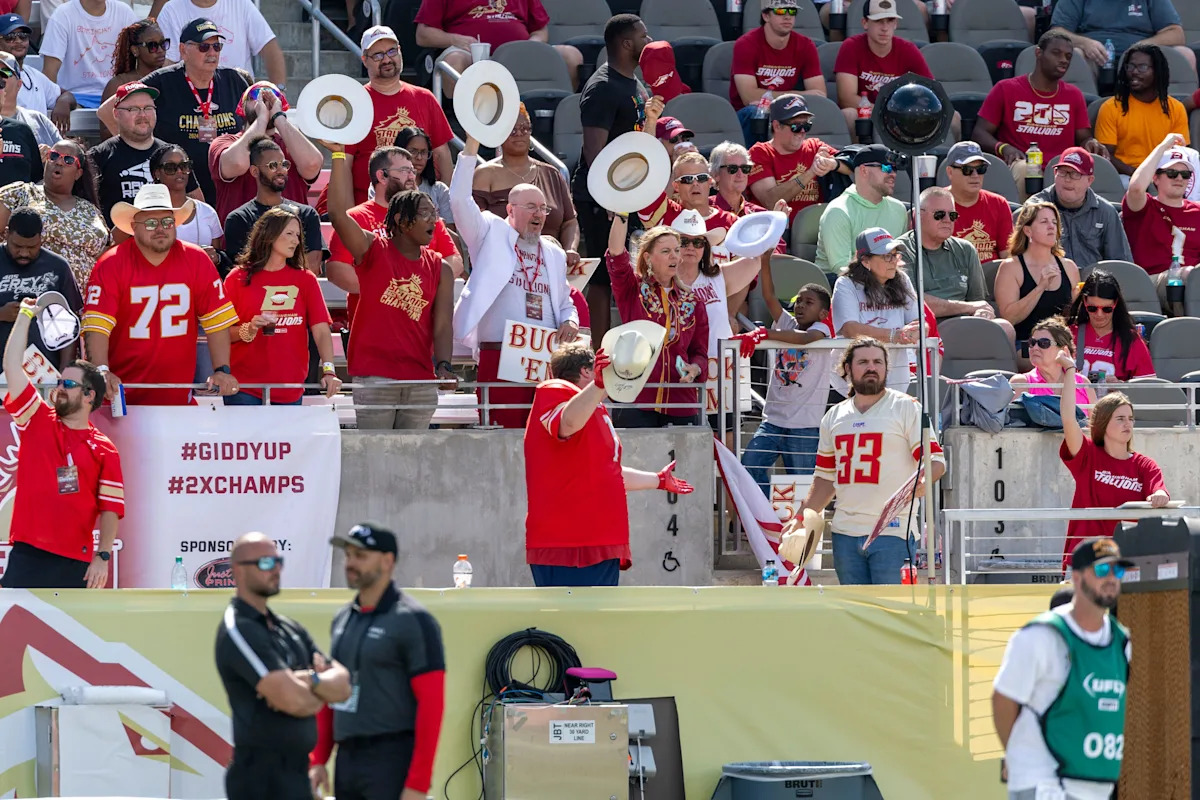The UFL (United Football League) finds itself in a challenging yet pivotal moment as it reflects on its second season amid declining attendance and television ratings. Despite these setbacks, the leadership remains optimistic about the league’s potential for growth and engagement.
In a recent report by the Sports Business Journal, the UFL’s overall attendance fell by 5% in 2025, a disappointing trend for an organization that had hoped to capitalize on its first unified season following the merger of the USFL and XFL. The figures tell a sobering tale: seven of the UFL’s eight markets saw declines in average attendance, with only the Michigan Panthers showcasing a significant 30.4% increase. Alarmingly, four markets—Arlington, Birmingham, Houston, and Memphis—averaged fewer than 10,000 fans per game. Additionally, the league experienced a drop in TV viewership, with an average of 645,000 viewers per game in 2025 compared to 812,000 in 2024.
Despite these statistics, UFL President Russ Brandon assured fans and stakeholders that the league is committed to overcoming these challenges. During the championship game media day in St. Louis, he expressed a proactive stance, emphasizing that the league is addressing its attendance issues head-on. “We’re not shying away from it,” he said. “It’s certainly something that we’re running towards.”
The sentiment echoed by UFL leadership revolves around the notion that the league is still in its infancy. Dany Garcia, the league’s owner, commented with a lighthearted attitude, “We haven’t even gotten to our ‘Terrible Twos’ yet.” This perspective underscores their understanding that a robust identity takes time to develop, especially in a competitive sports landscape.
The UFL’s first season as a unified league commenced just 15 months ago. The rapid merger prevented an adequate focus on strategic marketing and local engagement prior to 2024. Brandon acknowledged the operational challenges that stemmed from this swift transition, stating they were “drinking out of a fire hose” as they scrambled to launch the league.
In an effort to address the attendance declines, the UFL took a more focused approach in 2025, allocating resources towards building its presence in each market. This included adding personnel, increasing advertising efforts, and fostering connections between local markets and the main hub in Arlington. The league is in the midst of understanding its audience better, and both Garcia and Brandon emphasized that this year represented a crucial turning point for gaining clarity on the brand and its fanbase.
To push forward, the UFL has plans to reevaluate its engagement strategies in each of its markets. Brandon noted, “We know this: We have a great product. We know it’s affordable. We’re trying to activate as much as possible in each of these local markets.” The league is confident that a clear marketing strategy, coupled with community engagement, will help reinvigorate interest in local teams.
Despite the concerns surrounding attendances and ratings, UFL executives believe the league’s viewership numbers remain strong relative to other programming. Brandon even stated that many organizations would envy the amount of viewer engagement the UFL enjoys.
As the UFL gears up for its championship game between the Michigan Panthers and the DC Defenders, Executive Vice President of Football Operations Daryl Johnston highlighted the importance of celebrating the teams at the forefront of the league. “When the time comes and the time is right, then we’ll start to reflect back and find out some of the whys,” he said. This reflection will be crucial in identifying the reasons for the attendance downturn and discovering methods to enhance future performance.
In summary, while the UFL faces substantial challenges with declining attendance and ratings, its leadership is determined to focus on growth, engagement, and the overall development of the league. The optimism expressed by figures like Brandon and Garcia highlights a commitment to understanding their audience better and creating a lasting impact within communities. As they work to navigate these obstacles, fans and stakeholders are encouraged to remain hopeful, knowing that the foundation for a promising future is being laid out with intention and resilience.
Thus, the UFL, despite its current hurdles, aims to forge a stronger connection with fans and carve a meaningful space within the sports landscape in the seasons to come. As they advance, their focus will remain steadfast on fostering unity among teams and engaging communities more than ever before, reminding everyone involved that growth often comes through persistence in the face of adversity.
Source link










